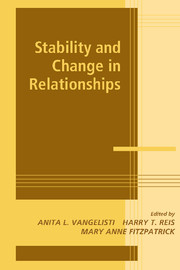Book contents
- Frontmatter
- Contents
- Contributors
- Preface
- PART ONE ACTORS: THE SCAFFOLDING OF STABILITY AND CHANGE
- PART TWO BEHAVIORS: THE PROCESSES OF STABILITY AND CHANGE
- 5 Serial Arguing over the Relational Life Course: Antecedents and Consequences
- 6 Communication, Relationship Concerns, and Satisfaction in Early Marriage
- 7 Sacrifice in Romantic Relationships: An Exploration of Relevant Research and Theory
- 8 Stability and Change in Social Relations: Perspectives from Gerontology and Stress Research
- 9 What Microanalysis of Behavior in Social Situations Can Reveal about Relationships across the Life Span
- 10 Developing a Multifaceted View of Change in Relationships
- PART THREE CONTEXTS: SOCIAL ENVIRONMENTS FOR STABILITY AND CHANGE
- Author Index
- Subject Index
5 - Serial Arguing over the Relational Life Course: Antecedents and Consequences
Published online by Cambridge University Press: 21 October 2009
- Frontmatter
- Contents
- Contributors
- Preface
- PART ONE ACTORS: THE SCAFFOLDING OF STABILITY AND CHANGE
- PART TWO BEHAVIORS: THE PROCESSES OF STABILITY AND CHANGE
- 5 Serial Arguing over the Relational Life Course: Antecedents and Consequences
- 6 Communication, Relationship Concerns, and Satisfaction in Early Marriage
- 7 Sacrifice in Romantic Relationships: An Exploration of Relevant Research and Theory
- 8 Stability and Change in Social Relations: Perspectives from Gerontology and Stress Research
- 9 What Microanalysis of Behavior in Social Situations Can Reveal about Relationships across the Life Span
- 10 Developing a Multifaceted View of Change in Relationships
- PART THREE CONTEXTS: SOCIAL ENVIRONMENTS FOR STABILITY AND CHANGE
- Author Index
- Subject Index
Summary
Individuals who believe that disagreements are healthy and resolvable are more satisfied with their relationships than are those who do not have such a perspective (Crohan, 1992). Unfortunately, remaining optimistic can be difficult. Marital arguing is linked to negative moods (Bolger, DeLongis, Kessler, & Schilling, 1989) and marital instability (McGonagle, Kessler, & Gotlib, 1993). Because arguing is an inevitable part of intimate relationships, researchers have investigated how individuals might conduct their disagreements so as to avoid negative by products. Although research provides useful insights, the methods typically employed yield a restricted view of arguing. With the development of sophisticated methods for studying interaction, researchers have increasingly focused their attention on the behaviors that occur during an argumentative encounter. Often couples enact an argument that is recorded, coded, and statistically scrutinized for patterns. This methodology affords a rigorous way to identify the behaviors occurring during an encounter, but the observed pattern could be limited to the specific interaction that was analyzed. In particular, focusing on a single argumentative encounter may provide little information about the developmental course of the disagreement (i.e., those processes that occurred prior to or after an argumentative episode).
Although treating arguments as though they are of limited duration accurately characterizes some disagreements, this approach does not capture the essence of others. Relational disagreements about a given issue can extend beyond single encounters (Benoit & Benoit, 1987).
- Type
- Chapter
- Information
- Stability and Change in Relationships , pp. 107 - 128Publisher: Cambridge University PressPrint publication year: 2002
- 11
- Cited by

